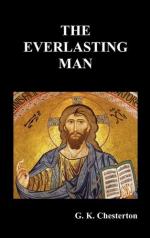
|
| Name: _________________________ | Period: ___________________ |
This test consists of 5 multiple choice questions, 5 short answer questions, and 10 short essay questions.
Multiple Choice Questions
1. What does Chesterton call the death of Jesus?
(a) Preordained.
(b) Timeless.
(c) The act of greatest consequence.
(d) The objective of his mission.
2. How is the creed of Jesus like a key, according to Chesterton?
(a) All of these.
(b) It is essential to keep its form.
(c) It is a thing with a pattern.
(d) It appears as an abstract, arbitrary shape.
3. What does Chesterton say would have happened if Christ had not come when he did?
(a) None of these.
(b) There would have been a void that would have asphyxiated mankind.
(c) Pagan religion would have kept endlessly changing.
(d) The world would have started worshipping demons.
4. Which of the following does Chesterton find striking about the story and teachings of Jesus?
(a) The order in which they come.
(b) The suggestion that he has not really come to teach.
(c) All of these.
(d) The intuitiveness.
5. Which of the following does Chesterton say was unheard of prior to Christendom?
(a) Martyrdom.
(b) A holy land.
(c) Church militants.
(d) None of these answers.
Short Answer Questions
1. Which of the following statements does Chesterton say about early Christians?
2. What does the intellectual distinction that Chesterton sees in Christ suggest to him?
3. To the Romans, who were used to hearing about so many different sects and religions, what does Chesterton say was different when they heard about Christ?
4. Which of the following does Chesterton say is a crucial element of the Christmas story?
5. What does Chesterton call the death of Socrates?
Short Essay Questions
1. According to Chesterton, how do Hector and Achilles compare when looked at historically?
2. Explain what Chesterton means when he says that Asia is old but Europe is born again.
3. Why does Chesterton attempt to look at the Gospels as one who had never seen them before?
4. What does Chesterton mean when he refers to the Church's ability to rise again?
5. What significance does Chesterton assign to the Christmas story happening in a cave?
6. How much have historical events aided or been obstacles to the continuation of the Church?
7. What was the religious state of Rome when Christ appeared?
8. Explain Chesterton's view on the role of the mother in the Christmas story.
9. What important role does Herod play in the Christmas story as Chesterton sees it?
10. Chesterton discusses the popular notion that early Christianity rose in a barbarous time and place. Explain Chesterton's views on this matter.
|
This section contains 949 words (approx. 4 pages at 300 words per page) |

|




